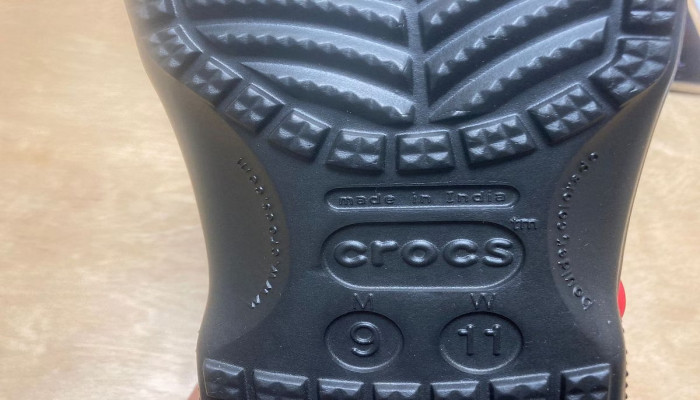Tamil Nadu is India’s new manufacturing hub for footwear production
- In Reports
- 12:12 PM, Jan 05, 2024
- Myind Staff
India has ventured into the non-leather footwear market with the production of Crocs at a newly established footwear park in Perambalur, located in central Tamil Nadu.
The manufacturing scope extends beyond Crocs, as renowned brands such as Nike, Adidas, and Puma are set to produce shoes in Tamil Nadu through Taiwanese giants. This shift aligns with a global trend towards adopting a China+1 strategy to diversify production and supply chains. Fuelled by the eco-friendly aspects of non-leather footwear, coupled with Tamil Nadu's strong manufacturing initiatives and a resilient female workforce, this development represents a triple impact on sustainability, diversity, and foreign investment.
India, often considered as trailing behind Vietnam and Indonesia in manufacturing and exports, has achieved a milestone with the establishment of its inaugural component manufacturing cluster in Perambalur Park. This accomplishment, built and operationalized within a year, includes the Crocs factory, a collaborative effort between Taiwan's Shoetown (Nike's largest contract manufacturer) and India's Phoenix-Kothari Group. The factory has successfully developed prototypes and is poised to commence production just before the state's global investors' summit in January 2024. Following this success, other Taiwanese companies are also in the process of establishing plants across Tamil Nadu.
With this first-mover advantage, Tamil Nadu has sketched an impressive arc of investment for itself — from automobiles to electronics and now non-leather footwear.
For context, India constitutes 13 percent of the global leather goods market, having exported $4.25 billion worth of leather goods in 2022, with Tamil Nadu contributing a substantial 48 percent share. The state's leather is utilized by renowned luxury brands such as Ferragamo, Prada, and Louis Vuitton. In contrast, India's exports of non-leather footwear were only $214 million in the fiscal year 2021-2022. However, Tamil Nadu is on the brink of transforming this scenario.
Industry experts believe that India has an advantage since Taiwanese businesses are selecting the state to establish non-leather shoe manufacturing over other possible competitors like Bangladesh, Indonesia, and Cambodia. The 2022 footwear and leather goods strategy of Tamil Nadu, which provides incentives and assistance for foreign investment, paved the way. Since then, the state has inked Memorandums of Understanding for investment initiatives in this field valued at least Rs 2,250 crore.
Then, the Indian government implemented quality control norms for the footwear industry in 2023, raising the standard of imported components and boosting domestic production— right on time for Tamil Nadu.
“The potential in this sector is vast,” said TRB Rajaa, Minister of Industries of Tamil Nadu, adding that the new footwear park in Perambalur and the DMK government’s sector-specific policy will capitalise on it. “Each large factory has the capacity to employ tens of thousands, and our ongoing negotiations with numerous international firms are promising. We are optimistic that Tamil Nadu will soon become a primary manufacturing location for all major global footwear brands.”
The Big Four of the non-leather footwear industry — which includes everything from bathroom slippers to sandals to heels to sports shoes — are Shoetown, Feng Tay, Pou Chen, and Hong Fu.
Among them, these companies produce the entire range of footwear for brands such as Nike, Adidas, Reebok, Puma, Converse, and Crocs. Presently, all four are establishing operations in Tamil Nadu, and there's a possibility of a fifth major contract manufacturer entering the scene.
For many market watchers, Taiwan’s entry into Tamil Nadu is a gateway to realising India’s manufacturing dreams. But geopolitics is a major factor, and timing is of the essence.
“The China+1 window has opened up, but it’s not open for long,” said Irshad Mecca, director of Farida Shoes, a leading manufacturer and leather exporter based in the leather hub Ambur. He estimates India has about three years to put its foot in the door and beat footwear competitors like Indonesia and Bangladesh.
Three key factors make Tamil Nadu especially alluring for global non-leather footwear companies, other than its general standing as a global manufacturing hub, according to Industries Minister Rajaa.
The first is that the state boasts one of the oldest leather clusters in India, with a history spanning over a century. “This rich heritage has fostered a dynamic footwear ecosystem and established international business connections, enabling a seamless transition to meet the non-leather sector’s demands,” Rajaa said.
The second factor contributing to Tamil Nadu's competitive advantage is the active involvement of women in the workforce. Additionally, the third factor is the state's dedication to addressing environmental issues through the promotion of renewable energy. Reports indicate that Tamil Nadu aims to achieve a 50% share of green energy in its grid by the year 2030.
Manufacturers are optimistic that Tamil Nadu is just the starting point. “Aatmanirbhar Bharat is an important programme,” said Dr. Rafiq Ahmed, chairperson of the Phoenix Kothari Group that set up the Crocs factory in Perambalur. “This kind of industry should be built up in states where employment is required.”
The positive outcome of Phoenix Kothari's collaboration with Shoetown has established a favourable example for other domestic players. Following this success, other states, such as Odisha, have extended invitations to Ahmed, urging him to establish factories in their regions and providing substantial subsidies for partnerships with Taiwanese companies. Madhya Pradesh and Maharashtra are also expressing interest in participating in this growing industry.
Image source: The Print







Comments